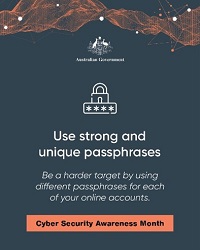Use strong passphrases

Does your passphrase pass?
A passphrase is four or more random words combined to make the most secure version of a password – it’s also easier to remember! For example, ‘blue house bus way” – the longer the passphrase, the harder it is for adversaries to crack.
It is recommended to use a passphrase instead of a password whenever you can.
What makes a secure passphrase?
- Create long passphrases: at least 14 characters with four or more random words that you’ll remember
- Create unpredictable passphrases: a mix of random words is more unpredictable than a sentence
- Create unique passphrases: use different passphrases for different accounts. Your work email and home email should be different passphrases.
Remember, do not include personal details in your passphrase. Yes, that does include your birth year, child or dog’s name, favourite sport, etc. are all detail that you should not use in your passphrase or password.
Another tip is, do not use predictable or default passwords; for example, Password123 or Admin.
Don’t think you’ll remember all your passphrases?
Do you often think you’re a walking dictionary just to access accounts you use every day? A password manager can help create, manage, and store passwords securely for each of your accounts.
You only need one master password, key or PIN.
It’s spring, the perfect time to review your accounts and clean up your passphrases – well, anytime is a good time but October being Cyber Security Awareness month is that extra bit of motivation.
Useful links:
- ACSC’s Set secure passphrases webpage has a video, case study and, quiz with general tips on setting and using passphrases
- ACSC’s Password managers webpage follows up with information on using a password manager
Webinar:
eSafety public webinar
Protecting your personal information online
Tuesday 22 October at 10am AEDT
National Cyber Security Coordinator Social links
Michelle McGuinness will be posting videos throughout Cyber Security Awareness month
![]() @aucyberseccord
@aucyberseccord ![]() @aucyberseccord
@aucyberseccord


